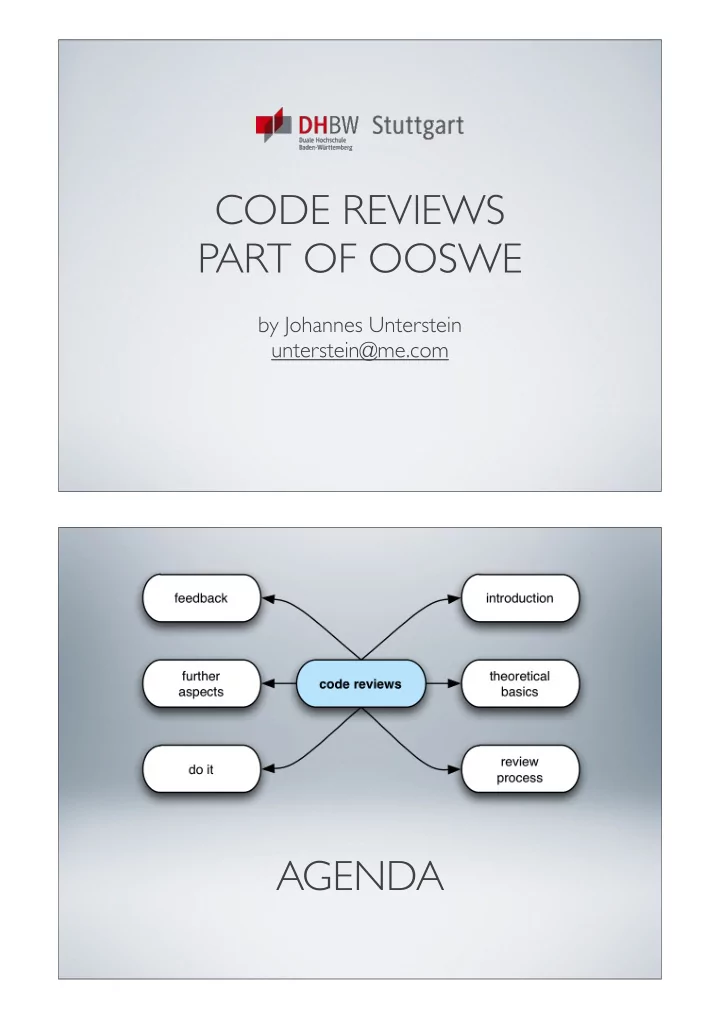

CODE REVIEWS PART OF OOSWE by Johannes Unterstein unterstein@me.com AGENDA
INTRODUCTION INTRODUCTION • Wording and communication • Periphery • Breaks • Test • Source code needed for practical review :-) • Server: http://it-review.dhbw-stuttgart.de/
MYSELF • Johannes Unterstein, unterstein@me.com • Finished DHBW in 2010 • Currently software developer at 1&1 Internet AG • huge and distributed eBusiness web application • e.g. eShops, WebAnalytics, Search engine marketing WHO IS HERE? • Which companies? Are you developers? • Who worked in a team yet? • How did you handle this situation? • Did your mentors reviewed your code? • Did you participate a code review? • What do you expect of this event?
WHY THIS EVENT? • My first commit at 1&1 • Objective view of source code • Separation of code remark and personal criticism • Better software quality • Desired presence in the academic world THEORETICAL BASICS
WHAT IS A REVIEW • Review in general • Look at things, re-view • After factoring process • Reflect things • Check correctness • View with mental distance TARGETS • Code • Components • Architectures, Designs • Refactorings, Tests • Projects
PRECONDITIONS • Team • Administrative • Ability of constructive • Objective and diplomatic criticism moderation • Common code base • Management • Common quality • Suitable software entitlement CLASSIFICATION • Important part of the software development process • Tool to improve software quality • No compensation for tests • Continuous vs. dedicated • It‘s not for free
WHY • Continuous quality assurance • Prevent bugs • Distribution of knowledge • „Acceptance ritual“, new co-workers • Estimate coding skills of team members • Improve coding skills of all participants WHAT KIND OF • Classic code reviews • Continuous code reviews • Extreme programming / agile processes • Open source
HOW TO USE • Classic review process and tools • Web based • Commit mails (minimum) • Early recognition • Mentor model • Outsourcing WHAT TO REVIEW • Defined amount of code • Semantically closed piece of software • Single commits • Diff of two revision • Size matters • Developers are expensive ;-)
WHO • Roles • People • Author(s) • According team • Organization • As much as possible • Reviewers • Good mix • Moderator COMMON REVIEW PROCESS the classic way
PREPARATION • Initialization • Organized by assistance or author(s) • Which code? • Which participants? • Meeting • Infrastructure DISTRIBUTION • Code • Defined revision or tag • Tools, accounts, access ...
INDIVIDUAL PHASE • Each participant reviews the code for himself • Makes remarks • Discipline • First step of knowledge transfer • Be thorough and handle with care • Take your time THE REVIEW • Plan enough time • Process • Don`t bother about usual • All points sequentially discussions • Decide if valid • Decide how to handle • May not fit all organizations • Decide who will handle
REWORK AND CHECK • Solve issues • Mark tickets as resolved • Check the rework and close the ticket FURTHER ASPECTS
PROFIT - PEOPLE • Author(s) • Receives feedback • Profits from the know how of other participants • Reviewers • Know how exchange • Profits from the know how of other participants PROFIT - CODE • Prevent, reduces bugs • Improves code quality • Improves code, product, project knowledge • Spreads knowledge
PSYCHOLOGIC ASPECTS • Acceptance • Oh god, my code is reviewed! • Inspection, disgrace, transparency ... • Objective view vs. take to be personal • The code isn`t you! • Positive experience for the author AUTOMATIC ANALYSIS • Goals • Tools • Improve software quality • Checkstyle • IDE build in tools • Classification • Findbug • Other metric tools
OUTSOURCING • Pros: • Cons: • Objectivity • Acceptance • Know how • Know how • New ideas • Internals • Best practices • Standards, ...
Recommend
More recommend